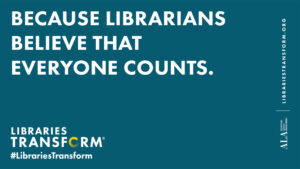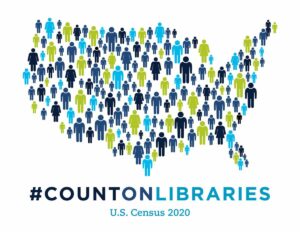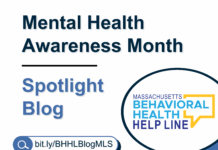
As you probably know, 2020 Census operations are already underway in Massachusetts! As trusted partners in their communities, libraries have an important role to play in this process. Recently we talked with Maura Deedy, Library Advisory Specialist at the Massachusetts Board of Library Commissioners (MBLC), who has been coordinating public library participation in 2020 Census at the state level:
Why is the 2020 Census important to libraries?
Maura Deedy: The United States Census is a decennial count of all people – inclusive of citizens, immigrants of all statuses, children, and students. The 2020 Census will count those who are living here on April 1, 2020. Data from the Census determines how federal funding, including library funding, is distributed to states. We want to make sure that Massachusetts gets its fair and accurate share of this funding. For example, in FY19 MBLC, received $3.3 million from Institute of Museum and Library Services (IMLS) through the Grants to States program, which is allocated on a population-based formula. (Source: Grants to States: State Allotments)
Speaking more broadly, the Census is important for local communities because those federal funds go to schools, health care, infrastructure, public safety, and more. In FY2016, Massachusetts received $22 billion from 55 federal spending programs. (Source: Counting for Dollars MA) Federal aid for the next ten years will be calculated on the 2020 Census count. Census data is also used to determine representation at the local, state, and federal level.
Libraries serve all people, including those who have been historically and disproportionately undercounted, including (but not limited to) young children, people of color and indigenous people, and people experiencing homelessness. The census is a tool to help build a democracy with fair representation of the people and to provide information to plan for services for the people. It is an important opportunity for people to participate in civic life who may not have the right to vote.

How is MBLC involved in the 2020 Census?
Maura: The Census Bureau’s goal is to count everyone once, only once, and in the right place. MBLC is a part of the Statewide Complete Count Committee, helping to raise awareness about the Census and motivate people to respond. We are sharing information with libraries to help make sure our libraries are prepared and how they can get more involved with local efforts.
So what do libraries need to know about the 2020 Census?
Maura: Where do I start?!
Libraries should know the basic facts about the census, why it is important, how it works, and how people will respond.
This is the first Census that will be collected digitally, and self-response is the best response. Public libraries can help support their communities in this process. (See below for specific ideas.)
Academic libraries can also help by providing information to students who may live off campus and are renters. Renters and people living in group quarters are undercounted. Colleges with on-campus housing have a special reporting form.
School libraries can raise awareness with students of all ages by incorporating the Census into story times, research using Census data, the history of Census data, and more. The Census Bureau has a Statistics in Schools curriculum.
What specific steps can libraries take to support the 2020 Census?
Maura: If libraries can only take one step to support Census 2020, it would be to prepare their computers for use, and promote awareness to staff and their users. (That’s two things, I know!) We recommend that all public libraries read through the American Library Association (ALA) guide and Census Bureau materials to help carry out these steps, and promote awareness among patrons via library signs and other communication.
For libraries that want to do more, there are many possibilities! For example:
- Hold Census filling-in parties!
- Mention the Census at the start of every story time to parents and caregivers.
- Host programs with Census Partnership Specialists for adults and teens.
- Add a blurb about the Census to library receipts.
- Run genealogy programs about using Census data.
- Join a Complete Count Committee in your municipality.
- Reach out to local groups who are doing Census outreach, and let them know about the services the library has.
From a technology standpoint, this will be the first census where people have the option to respond online. Many of these people may be using a computer or accessing the internet for the first time. Some public or academic libraries may have a dedicated computer for census completion.
 Where can libraries learn more about the 2020 Census?
Where can libraries learn more about the 2020 Census?
Maura: MBLC has a resource guide which aggregates data and information from a variety of sources. We also recommend these Census 2020 resources from:
You can also get updates and tips from these email discussion lists:
Interview with Maura Deedy, Massachusetts Board of Library Commissioners
Interviewed by Kelly Jo Woodside, Massachusetts Library System


